” Google “ is the most powerful and popular search engine in the world, but it is first and foremost the name of one of the biggest computer companies of all time. It has been the undisputed leader in its field for many years and this position is reinforced by the many services and tools it offers
It’s no longer a secret that Google is the main protagonist in Internet search worldwide. It offers its many users fast, free, open and efficient access to the web, the world wide Web.
But still ?
Google attributes go way beyond that.
To help you get to know Google better, this article covers, among other things:
- What Google actually means;
- The history of its creation to the present day;
- How big is it as a company?
- What is Google’s operating policy?
- What are the offers of the famous company?
- What is the role of the search engine in the world of SEO?
- And more.
Since the subject of this content is of the greatest importance, I invite you to follow it with the greatest attention.
Chapter 1: Google – Definition and History
During their frequent surfing on the web, almost all Internet users have probably already heard of Google at least once.
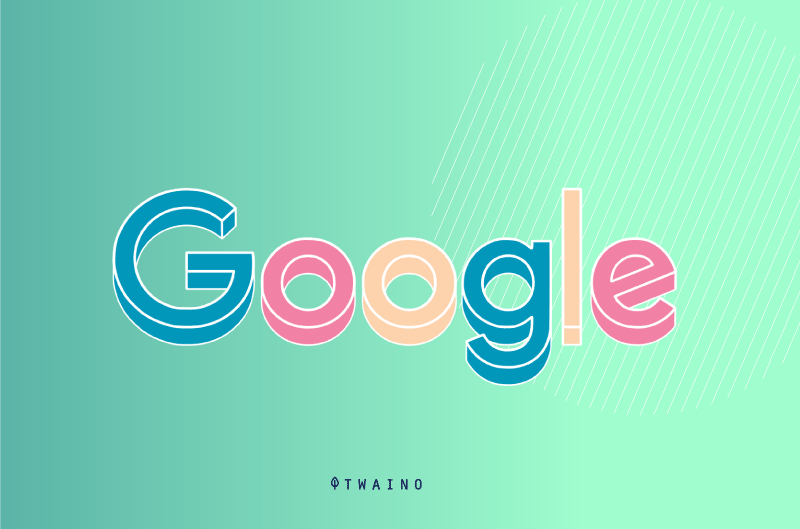
Well, what is Google?
Let’s do the presentations properly and then look at the history of Google.
1.1. What is Google? The actual presentations
It is important to start with this presentation by introducing Google as the great power of the web.
Google is actually the name of an American multinational initially specialized in Internet-related services and products which today also operates in health and robotics.
The American giant is a member of the famous Big Tech or Big five also known as the Tech Giants. In other words, he is part of the elite of the technology sector.
Google is in fact one of the top 5 dominant companies in the technology sector in the United States and around the world.
- Apple ;
- Google (Alphabet) ;
- Microsoft ;
- Amazon ;
- Facebook ;

If the company is so prosperous and famous, it is mainly because of itssearch engine efficient and secondarily because it is one of the best companies
listed on stock exchanges around the world.
On the other hand, the development of new services combined with a formidable policy of strategic acquisitions has enabled it to build up a large arsenal at the cutting edge of innovation.
Thus equipped, Google quickly established its authority and strengthened its positions as a leader in the search industry.
Such an impressive list of achievements was certainly not created in a day!
1.2. What’s the story behind Google?
A look back at the key moments in Google history.

Here is a small overview of the chronology of the facts as well as the main dates of the American Internet giant.
1.2.1. Originally: The founders of Google
Co-founded by Larry Page and Sergey Brin during their studies at Stanford University in California (United States), Google was born in the 1990s.
Where does Google come from?
In 1996, at their university premises, the famous newly graduated duo participated in a research project on search engines led by Larry Page himself in the Stanford computer science department.
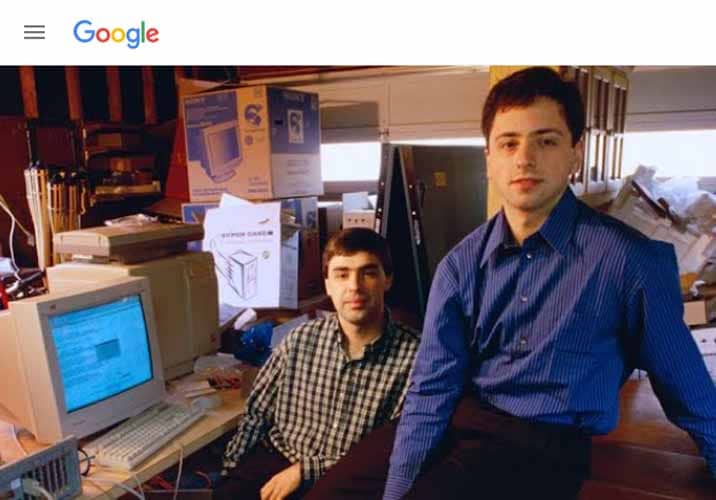
Unlike other current search engines which focus exclusively on the frequency of appearance of keywords, this one is based on the relevance of web pages individually considered based on the number of links (backlinks) they have. .
The foundation of what would become thePageRank !
This new search engine, Larry Page and Sergey Brincalled “BackRub”.
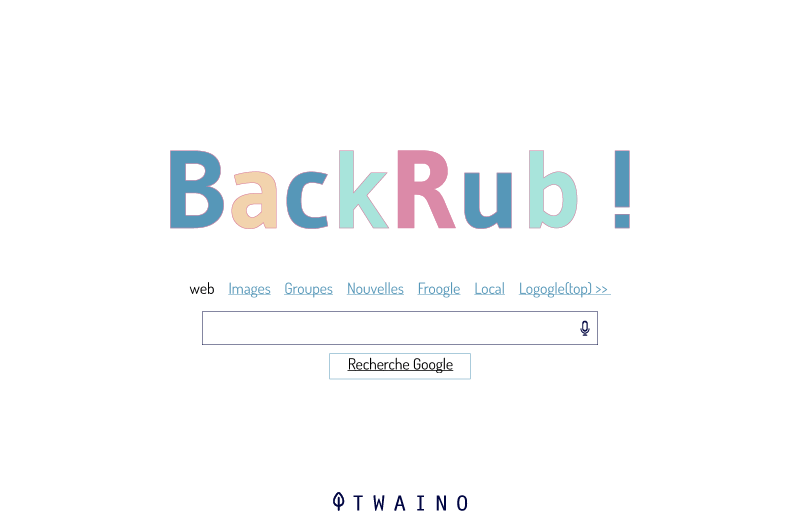
A
At the time, according to a cached copy of the search engine, BackRub indexed approximately 75 million URLs, including 30 million HTML pages and mainly email addresses for the rest.
BackRub has beencoded in Java and Python. Furthermore, it ran on several Sun Ultras and Intel Pentiums with a Linux operating system.
It is important to remember, Larry Page and Sergey Brin were assisted by Scott Hassan and AlanSteremberg on the technical side during the development of BackRub.
Shortly after its launch, BackRub was eventually renamed to Google in1997.
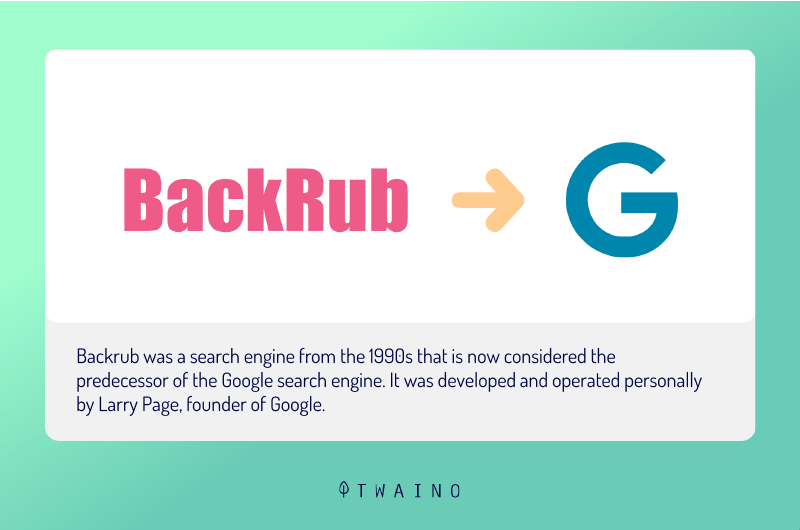
1.2.2. Where does the name Google come from?
One thing we can clearly say about Google is that the origin of its name is most unusual. Coming from the renaming of the old search engine BackRub, Google looked like this in its early days.
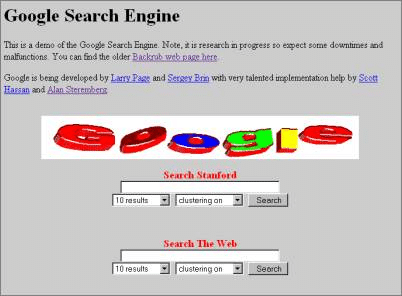
Source blogoscoped.com
At the time, it was necessary to find a name capable of reflecting the ambition of Larry Page and Sergey Brin to create a search engine capable of organizing a colossal volume of information on a planetary scale in order to make it accessible and useful for everyone.
This is the nameGoogle which was then chosen to represent this ideal.
Google is a term that actually refers to the English wordGoogle. Otherwise writtenGogol, this is a mathematical term used to designate the number formed by the digit 1 followed by a series of 100 zeros (ten to the power of one hundred =10100).
Product of a Google spelling error, Google is a name that perfectly reflects the mission of the company’s founders.
1.2.3. Google: From the small startup of the past to the giant of today
In 1997, newly named, the Google search engine is quickly becoming the center of attention of the academic community, but also that of several investors in Silicon Valley.
In the month ofAugust 1998, the co-founder of Sun Microsystems, Andy Bechtolsheim noticed the great potential of Page and Brin’s work and then decided to inject a sum of 100,000 USD into the project.This is how the company Google Inc. was officially born on September 4, 1998.
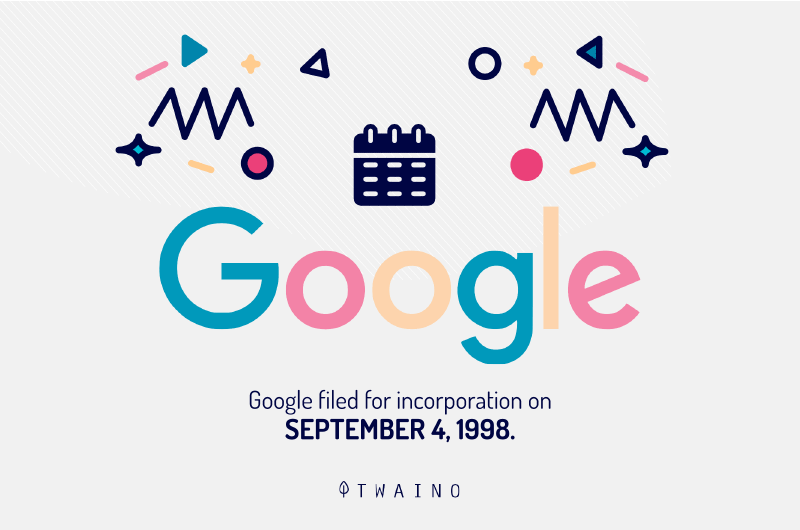
From this investment, the newly formed Google team moved to set up its first office in Susan Wojcicki’s garage in Menlo Park, California.
In June 1999, the company receives new investors. Sequoia Capital and Kleiner PerkinsCaufields & Buyers send 25 million USD to Google. At the time, the search engine recorded 3 million searches daily.
In August of the same year, the growing team left the garage to finally move into the Googleplex, the company’s current global headquarters in the Mountain View district, also in California.
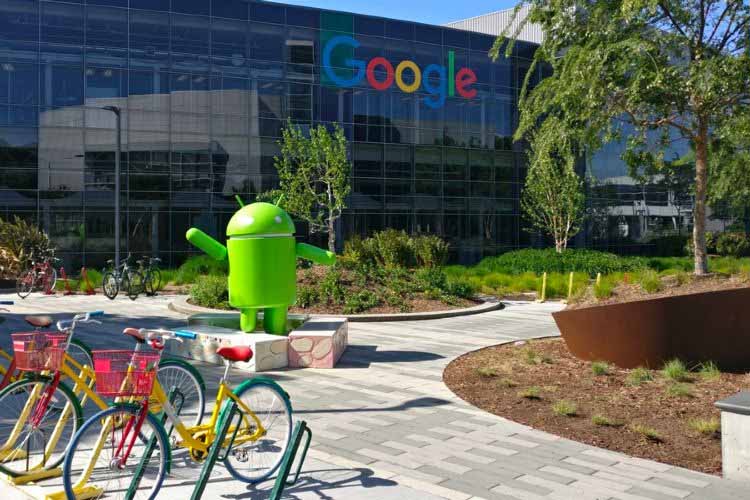
Source blogspot.com
The following year, in June, Google clearly became the most comprehensive search engine that has ever existed, with more than half a billion web pages referenced.
Shortly after, Eric Schmidt was invited tomars 2001 to lead the company which soon reached profitability with 3 billion web pages already listed.
Google then went through an incredible phase of growth combining variouspartnerships as well as the continuous launch of new services and features.2004 is a decisive year. The search engine exceeds 6 billion web pages organized in its index. THEAugust 19, 2004, the Google company makes its IPO and takes Wall Street by storm on the NASDAQ.
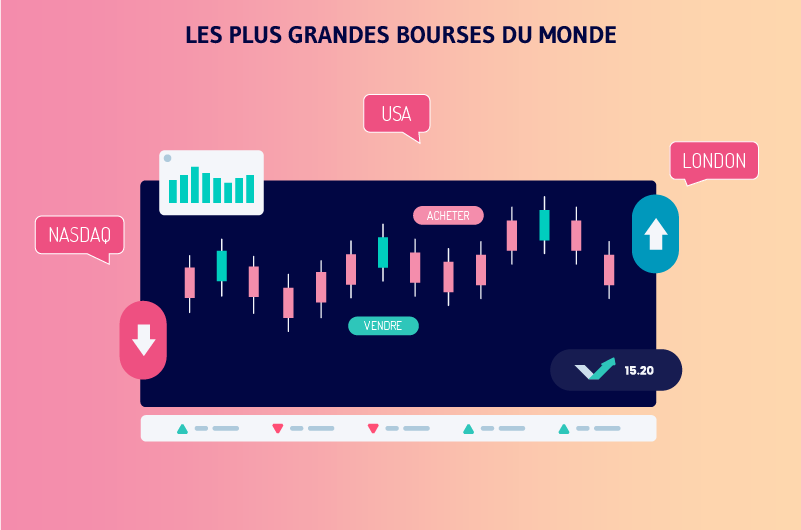
In the years that followed, the search engine continued to grow and improve. These then followed numerous minor and major modifications such as the implementation ofGoogle Caffeine, ofGoogle Panda filter, etc.
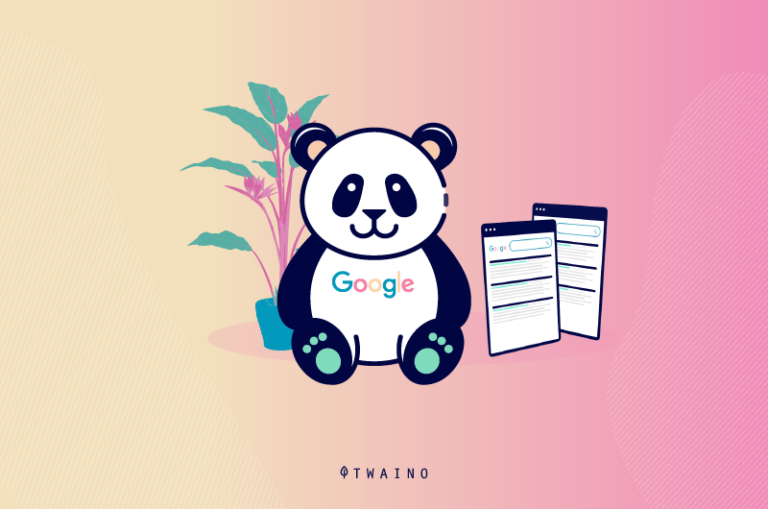
Like its search engine, the company itself continues to develop. Google makes many successful acquisitions including:
- Android ;
- Writely (futur Google Documents) ;
- YouTube ;
- Doubleclick ;
- And many others.
In addition, he lifts the veil on his many promising projects, namely:
- The Android operating system;
- The Open Source Chrome browser;
- Google+ ;
- Etc.
Far from the simple search engine of its beginnings, Google continues to gain power over the years and becomes the undisputed leader in its category.
Since then, the Mountain View company has become, after restructuring, a subsidiary of the parent company Alphabet.
1.2.4. Google and Alphabet: What is it really?
InAugust 2015, Google, an independent structure, officially becomes a subsidiary of the business conglomerate Alphabet Inc.

The new holding company Alphabet Inc. was created in order to separate things and isolate the many related areas of intervention of the North American giant:
- Home automation with Nest Labs (smart thermostats);
- Optical fiber for high-speed Internet with Google Fiber;
- Robotics and artificial intelligence with Google X Lab (the autonomous car);
- Biotechnology with Calico (research on aging and disease);
- Finance with Google Ventures & Capital (investments);
- Etc.
As a result, these related programs (commonly called moonshots) will be individually supervised and developed alongside Google’s original activities:
- Google search;
- The advertisement ;
- YouTube ;
- Google Maps ;
- Android ;
- Etc.
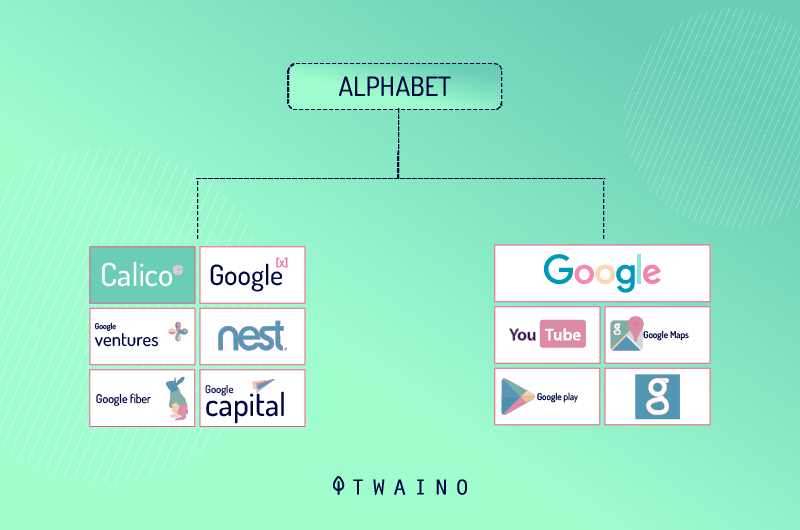
Thus linked to its “Alpha Bet” (a bet on the future), Google retains its names« GOOG » And« GOOGL » in sotck exchange. As its primary subsidiary, it further represents a holding company for Alphabet’s Internet properties and interests.
Google’s transition to Alphabet also came with a bit of an internal shakeup.
That year, founders Larry Page and Sergey Brin respectively became CEO and president of Alphabet, leaving management of Google to Sundar Pichai. The latter will subsequently be brought to the head of Alphabet inDecember 2019.
All this reorganization and decentralization of activities has the sole aim of clarifying the objectives of the multinational and thus strengthening its impact and stability in the face of external forces.
A rather successful initiative since today, Alphabet is one of the main market capitalizations in the world with an estimated value of 1,171 billion USD on16/01/2021. The company now has a little more than60,000 employees in nearly 60 different countries around the world.
As you will have noticed, Google is not a company like any other and everything clearly suggests that it does not intend to become one.
What are the Mountain View giant’s objectives?
Chapter 2: Google’s objectives Google – A clear goal, policy and principles
What are the motivations that drive the Internet giant?
2.1. Google’s great mission
Both ambitious and laudable, the mission of the number 1 search engine has remained the same since its creation.
As he likes to point out, theGoogle goal East :“to organize information on a global scale in order to make it universally accessible and useful for all”.

If the company manages to grow exponentially and achieve feats on the path to innovation, it is thanks to its global commercial strategy anchored on the foundation of values.
From the beginning, Google has made a point of following its mission and corporate vision, a decision that has earned it a place today among the top most valuable brands in the world.
2.2. Google: A fascinating and innovative vision
Google’s official statement regarding its vision is as follows:
“Providing access to information from around the world in one click”
When we consider Google’s primary business, it is clear that the company’s services are direct manifestations of its vision.
And for good reason, the search engine service indexes web pages and manages colossal databases in order to allow all individuals to truly access information from around the world.
When it comes to accessibility, Google is also there, because it offers the vast majority of its products free of charge to everyone on the planet.
Another aspect raised by the statement of this overall vision is the ease of access reflected by the “one click” component. The North American multinational also checks this box by offering its users innovative, practical and precise products.
The title of the Mountain View giant’s vision effectively underlies all of its strategies. Applying this vision allows Google to reach new heights through innovation and thus secure its place at the table of the dominant companies in the technology sector.
In reality, if the company manages to keep at bay the competition that rages in the global online advertising market, it is mainly thanks to its commercial situation inspired by its mission and its vision.
2.3. Google’s core values
At the time of its creation, Google listed a number of principles that serve as a guideline in achieving its mission and vision. Regularly revisited, this list of principles clearly represents the company’s promises to its users.
Anchored in values, Google therefore makes a point of ensuring that its various actions are truly in line with its philosophy. Currently numbering 10,the fundamentals of Google can be presented as follows:
1. Always put the interests of the user first, everything else will follow.
The Google company constantly strives to offer Internet users auser experience exceptional. All its products and services are designed to guarantee the comfort of users (ofuser interfaces intuitive and refined, non-intrusive and relevant advertising, etc.).
2. Focus on one thing and do it very well
Google is mainly dedicated to its core business which is internal search. All of its activities are focused on this point and the company also employs the power of its research technology in its products as well as in unexplored areas.
3. Provide service ever faster
Google prioritizes speed for its products and services. The idea is to instantly provide the answer the user needs. The company has broken its own speed record many times.
4. Democracy on the web works
If Google search is still functional and effective, it is because its technology trusts Internet users who determine the value of content offered on other websites by adding links to their own.
The importance of a web page is evaluated according to more than 200 criteria which take into account users, their experiences and their opinions on the pages in question.

It is therefore the Internet users who decide!
5. Provide a better user experience on mobile devices
Like the world, Google is moving towards mobile by creating technologies and offering new solutions adapted to mobile devices.
6. User satisfaction before questions of interest
Google earns its revenue from internet search and advertising. However, the company makes a point of regulating all of its advertising programs and practices in order to maintain the quality and relevance of its services.
7. The volume of information is constantly growing
Google uses its best resources and explores new avenues to guarantee Internet users optimal access to all the information available in the world.
8. The need for information is universal
This is why Google has premises in more than 60 countries and manages more than 180 different internet domains. Google search results are available in more than 130 languages and 50% of them are delivered to people in countries other than the United States.
9. You can be serious without wearing a tie
Here Google highlights its corporate culture based on creativity, teamwork, pride in individual accomplishment in a stimulating, fun professional environment. Employees are placed at the very heart of the innovation process and each of the ideas expressed in this relaxed atmosphere is immediately evaluated, tested and put into practice.
10. We can always do better
No matter the level of excellence achieved, we can still improve. Google often sets unattainable goals with the idea of surpassing itself. Demonstrating innovation and perseverance, the company breaks records and greatly distinguishes itself from its peers.
2.4. Google’s operating policies
Google offers free products and services to its users around the world to help them find answers to their questions and make their lives easier.
How does he achieve this? In broad terms, here ishow google works.
2.4.1. How does Google fund its free products and services?
It’s no longer a secret that the majority of Google’s revenue comes from advertising. Google’s business model is based on advertising and billing based on the number of clicks (targeting specific queries bykeywords) respectively onGoogle Ads and Google AdSense.
These are, in fact, advertisements broadcast in a controlled manner in search resultspertinents on Google.com which constitute its main livelihood, even if the company markets other products:
- Des smartphones Pixel ;
- Applications on the Play Store;
- YouTube subscriptions;
- Tools for businesses;
- And much more.
Revenues generated from the sale of advertising space to businesses are used to finance the company’s products and services. This is how Google makes most of its products available to the public free of charge, such as:
- The search engine ;
- Google Maps assisted navigation;
- Gmail messaging;
- The Google Docs office suite;
- The Google Chrome Internet browser;
- The YouTube video service;
- The Android operating system;
- And many more.
2.4.2. How does Google manage its users’ personal data?
Among the countless products that Google offers, there are a large number that can be used for free, without connection and which do not necessarily require the recording of any personal information from the user.
Conversely, certain products require the recording of certain personal information of the user for their correct functioning. This is why you are, among other things, able to:
- Benefit from automatic completion during your searches;
- Avoid traffic jams when going to work using Google Maps;
- Benefit from relevant and personalized content or advertisements according to your interests;
- Receive notifications when suspicious activity is detected (a connection to your Google account from an unusual geographic location or device);
- And more.
2.4.2.1. Google protects your personal information
Google is clear on this subject, it never sells personal information collected from its users in any way.
If advertisers pay the company, it is only for the ad placements.
Google does not receive any payment from its advertisers or third parties in exchange for any personal information (name or email address). Your information will only be shared if you explicitly request it. And of course they will never be monetized.
Furthermore, be aware that the advertisements which are offered to users during navigation are in no way based on sensitive information such as:
- The religion;
- Ethnic origin ;
- Sexual orientation;
- Etc.
All your personal information is collected and then stored with the greatest respect in a secure context. Google personally ensures the security of its users’ information using cutting-edge technologies (advanced encryption, differential confidentiality, etc.).
2.4.2.2. Google lets you control your data
As Google users, your data is confidential. How bad are they? It’s up to you.
Aware that each of its users may have different expectations regarding the confidentiality of their data, Google gives you the opportunity to make your own choices. And for good reason, it includes clear and effective privacy settings in each Google account and in all its products so that you can choose according to your convenience.
Everything is also done to ensure that users have the opportunity to make free and informed decisions regarding the advertising messages displayed to them.

You therefore have the possibility to know why an advertisement is presented to you and to block it if it is no longer relevant.
Most importantly, you are free to manage in the ad settings the data that is used to serve you personalized ads. If the type of advertisements presented do not suit the user, they can deactivate them at any time.
Chapter 3: Google – A ubiquitous and essential entity
A major player in the digitalization of the world, Google is today part of the lives of Internet users. Having become gigantic over the years, the company has managed to make itself useful and then indispensable on a daily basis.

The activities it offers in general and web search in particular are now anchored at the very heart of our morals. So much so that most major dictionaries like Merriam-webster and Le Robert insert the verb in their writings« to google» or« googles» in French which simply means “to search the web”.
Furthermore, Google.com and YouTube.com remain the domain names of the most visited websites in the world.
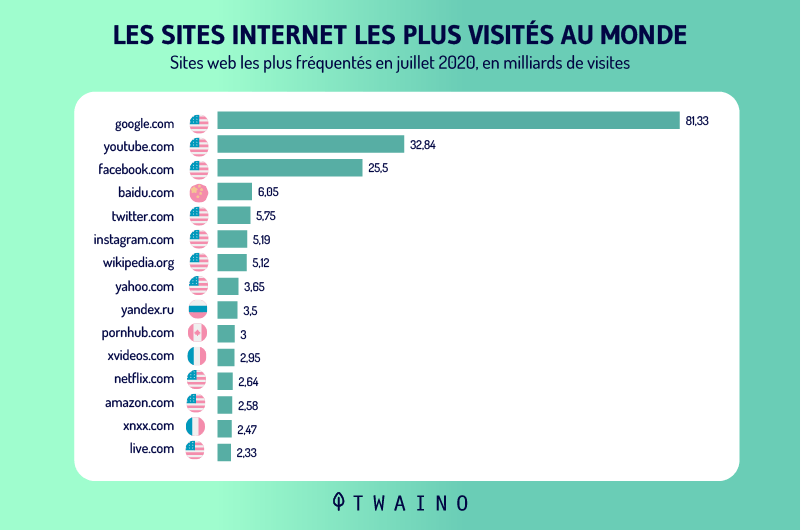
To truly understand Google, it’s important to take a look at the company’s numbers, products and services.
3.1. Google: Champion statistics
3.1.1. Google search engine figures
As you will have understood, web search is Google’s best-known and most used activity among the general public.

Having become the arch leader in its category, Google dominates the world of search in most countries with the exception of Russia and China where they are respectivelyYandex AndBaidu which are the most represented.
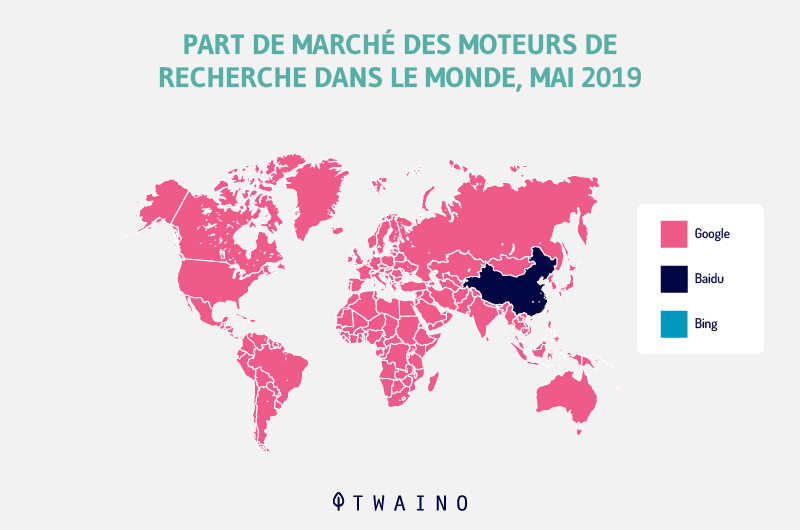
According to recent estimates of search engine market shares, Google still holds a monopoly in the sector globally with exactly92,8 % and in France with92,29 % market shares in August 2021.
Globally, just behind the Google search engine, the following search engines are successively positioned:
- Bing ;
- Yahoo ;
- Baidu ;
- Yandex ;
- DuckDuckGo ;
- Then the others.
If Google patronizes the world of search engines, it also leads the way when it comes to web browsers. With64,92 % of global market share, the Google Chrome browser continues to be at the head of browsers in August2021, far from its peers.
- Safari : 18,77 % ;
- Edge : 3,56 % ;
- Firefox : 3,54 % ;
- Samsung Internet : 3,06 % ;
- 0pera: 2.17%;
In addition to its unchanged first-in-class rank, the Google search engine also achieves incredible feats.
- 130,000 billion web pages listed in the Google index, or around 110 million GB of data stored on the company’s servers;
- 20 billion websites are explored daily by crawlers;
- 6.9 billion requests are processed daily at 80,000 per second with 15% new requests each day;
3.1.2. Financial results of the multinational
When the Alphabet holding company revealed its dazzling financial results with those of Google on30/06/2021, It appears that over the last twelve months which have just passed, the parent company itself made a profit amounting to 62.9 billion USD. Which equates to an increase of 166.2% over 1 year.
For its part, Google posted a turnover of USD 220.3 billion, which corresponds to an increase of 32.7% over 12 months.
When we only consider Google’s activities during the 2nd quarter of 2021, revenues amounted to USD 61.7 billion, which represented 99.7% of Alphabet’s turnover.
As one might expect, these gains from Google’s historical business come primarily from Google Ads (57.7%), followed distantly by Google AdSense (12.3%), YouTube Ads (10.8%) and others.
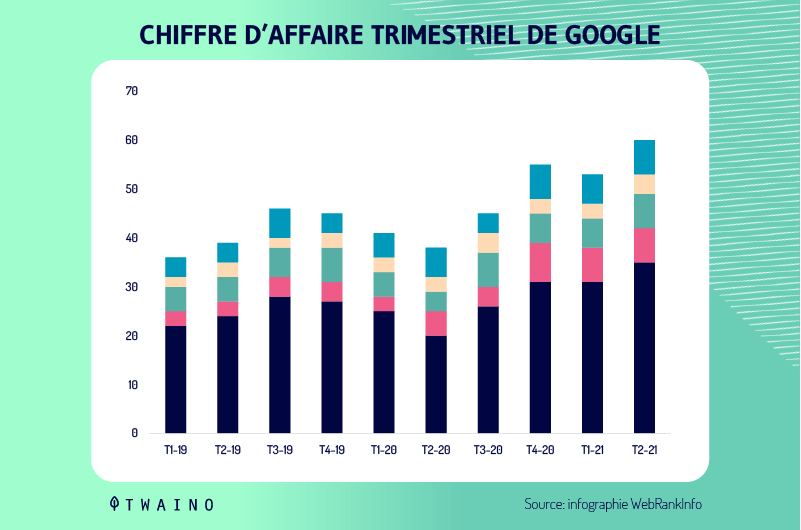
3.2. Google: Products and services for all situations
After the creation of its search engine, the diversification of the technology giant’s services was not long in coming.
Thanks to Google’s immeasurable love for innovation, the company has been able to develop new, high-performance products and services without turning away from its original activity, which is also constantly improving.
Thus, the products offered by the company combine the best in technology and are used on a daily basis in various fields.
In thelarge catalog of services offered by Google there are more than 230 products intended for individuals, businesses and developers.

Thanks to this range of products and services, Google solves problems in many sectors and therefore simplifies and improves the lives of its users.
Chapter 4: SEO and Google
If for the vast majority of Internet users the Google search engine is mainly used to access information, for professionals, it represents the main lever to use to gain visibility and increase traffic to their website.
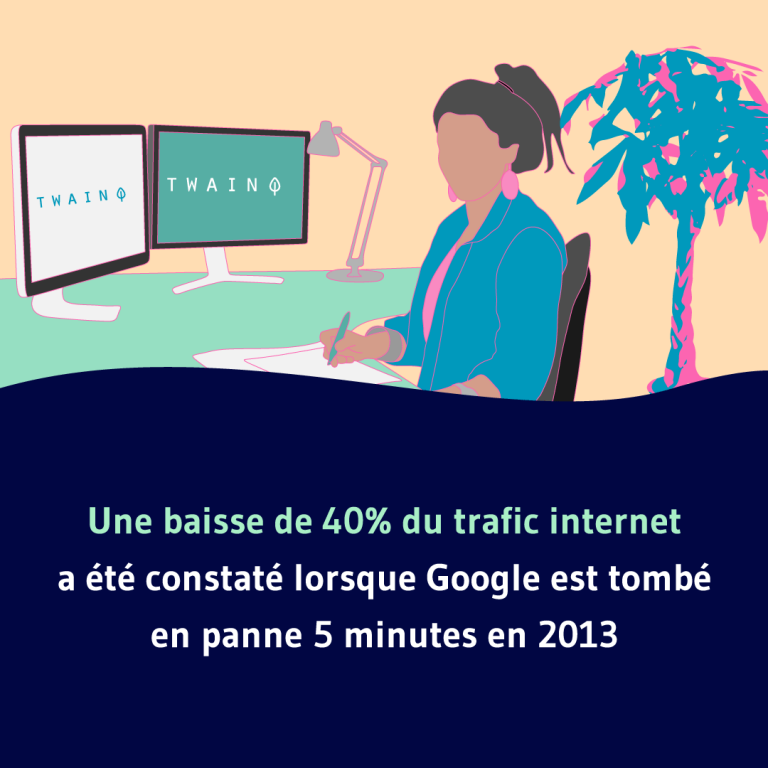
Main achievement of Google, the eponymous internet search engine is by far the most important search engine, particularly for directing Internet users to other websites.
It integrates numerous algorithms which are regularly updated. Indeed, the search engine evolves according to new challenges and updates whenever necessary.

These filter search results to only display the most relevant sites according to the user’s query.
Almost all Internet users particularly appreciateSERP (Search Engine Result Page) from Google for their relevance, but also for their neutrality.

And for good reason, the Google search engine displays the best satisfaction rate among Internet users.
In the world of SEO, it acts as a beacon and your website’s SEO strategy should be primarily built around it.
4.1. Google’s efforts for SEO
Also called natural referencing,THIS (Search Engine Optimization) brings together a set of practices and techniques that make it possible to make your website appear and position itself in Google search results.

Because the Google search engine is a realBlack boxwhich is based on aalgorithm complex and ultra-secret, it may seem difficult to optimize your website, particularly for Google, but this is not the case.
On the contrary, the search engine has taken care to detail the different parameters which govern the ranking of websites in its SERPs. Google provides website operators with the various elements they need to ensure optimal SEO for their websites.
With this in mind, the American firm has taken care to develop efficient tools in order to facilitate the work of SEOs. In terms of SEO, these include:
- Google+ ;
- Google Alerts ;
- Google Analytics ;
- Google Keyword Planner ;
- Google Maps ;
- Google Mobile-Friendly Test ;
- Google My Business ;
- Google PageSpeed Insights ;
- Google Search Console ;
- Google Trends ;
- YouTube ;
- Etc.
In addition to SEO, we also haveSEA (Search Engine Advertising) or paid referencing in reference to advertising on Google. As you know, Google sells sponsored commercial or advertising links (Adwords).
4.2. The importance of natural referencing on Google
In this era where competition is raging, it is more essential than ever to implement an effective SEO strategy in order to guarantee the adequate optimization of your website and thus appear in the first Google results.

And for good reason, natural referencing is by far one of the main, most profitable and effective digital marketing solutions.
SEO offers aqualified organic traffic and the flow it provides is constant and perfectly predictable.

The return on investment in SEO is visibly exponential, provided of course that it is correctly implemented.SEO strategy from the start.
How to succeed in your SEO web referencing?
To really achieve this, you must first know and apply Google’s own SEO best practices.
To deepen your knowledge of natural referencing, I invite you to religiously browse the content offered on theTwaino SEO blog. Through exhaustive and above all practical mini-guides as well as some SEO case studies, you will understand natural referencing in its smallest details.
Furthermore, if you have difficulties regarding the natural referencing of your website, theagence SEO Twaino also provides you with many effective services to help you move your website up in Google rankings.
Chapter 5: Other Google products
Over the years, Google has expanded its range of products and services, providing a wide variety of options to consumers. In addition to its iconic search engine, Google now offers a multitude of innovative applications and technological devices such as:
5.1. Google Docs, Sheets et Slides
These three applications are part of Google’s web office suite, known as WordkSpace. They include a word processor, a spreadsheet and a presentation tool respectively, all accessible from any web browser connected to the Internet.
Providing simultaneous, real-time collaboration, these applications enable distributed teams to work together on common projects seamlessly and efficiently.
5.2. Gmail
Unveiled in April 2004, Gmail is a free, ad-free email service offering up to 15 GB of storage space shared between Gmail, Google Drive and Google Photos.
Thanks to its advanced features, such as automatic detection of important emails or automatic spam deletion, Gmail has quickly become one of the most popular mailboxes in the world.
5.3. Google Calendar
Google Calendar is a digital calendar synced with personal or work Google accounts.
Allowing you to plan and organize appointments, events and reminders, Google Calendar can be viewed across devices and integrated with other Google apps to ensure optimal management of daily commitments.
5.4. Android
Revealed in November 2007, Android is an open source mobile operating system based on Linux, primarily intended for smartphones and touchscreen tablets. Owned by Google, Android is currently the most widely used mobile operating system in the world, ahead of Apple’s iOS.
5.5. Google Chromebook
Marketed in June 2011, the Chromebook is a category of laptops operating exclusively under the Chrome OS operating system, specially designed by Google. Easy to use and focused on web browsing, Chromebooks provide an affordable and secure alternative to Windows and Mac computers.
It should be remembered that the list of other Google products is long and we cannot know them.to present all.
Chapter 6: Google History FAQ
5.1. What is a doodle and how many are there?
THEdoodles are fun, one-off changes that are regularly made to the Google logo around holidays and birthdays. They also serve to commemorate the lives of famous people who reflect the personality of the Mountain View firm.
To date, there are more than 4,000 doodles. The first in this long list was designed long before Google was officially created. At the time it was used to announce that the founders of Google were participating in the Burning Man Festival.
5.2. Who is Yoshka and what is his role at Google?
Yoshka is the name of Google’s first dog.

Source Google
He became the company’s mascot when it had just moved into its first office in Menlo Park. Today the web giant has many other dogs.
5.3. When and by whom was Google invented?
Google was invented by two Stanford graduate students, Larry Page and Sergey Brin, in 1996. They initially called their project “Backrub,” but renamed it Google in September 1997. The company Google Inc. was officially established on September 4, 1998.
5.4. How does Google search ranking work?
Google search rankings are based on a complex algorithm that takes into account several hundred factors, including the relevance of pages to the search query, the quality of inbound links to each page, and the overall popularity of the site. web. The goal of this algorithm is to provide users with the most relevant and useful information possible for their search queries.
5.5. Where was Google’s first headquarters located?
Google’s first headquarters was located in Susan Wojcicki’s (the current CEO of YouTube) garage in Menlo Park, California. This is where Larry Page and Sergei Brin developed their search engine and eventually moved to a real office after securing $1 million in funding.
5.6. What was the first product released by Google?
The first product marketed by Google was the eponymous search engine. It was launched in beta in 1998 and quickly gained popularity thanks to its ability to return more relevant search results than its competitors.
5.7. When and how did Google acquire YouTube?
Google acquired YouTube in October 2006 for $1.65 billion in stock. The deal came about after Google noticed the rapid growth of YouTube as a popular video platform and saw an opportunity to further expand its online advertising business.
In summary
Google is a successful company with a noble mission and unwavering values. It has stood out from its peers thanks to its perpetual culture of innovation. Its search engine has always been unmatched with extraordinary performance and features.
In this article, we have generally seen the journey of Google since its creation to date, its services as well as its performance. You now know its importance in terms of SEO and how to successfully optimize your website.
See you soon !



